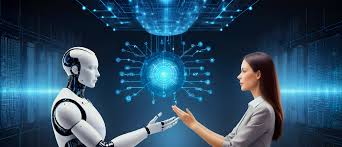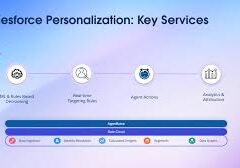The Future of AI: What to Expect in the Next 5 Years
In the next five years, AI will accelerate human life, reshape behaviors, and transform industries—these changes are inevitable. Collaboration Between Humans and AI.
For much of the early 20th century, AI existed mainly in science fiction, where androids, sentient machines, and futuristic societies intrigued fans of the genre. From films like Metropolis to books like I, Robot, AI was the subject of speculative imagination. AI in fiction often over-dramatized reality and caused us to suspend belief in what was and was not possible. But by the mid-20th century, scientists began working to bring AI into reality.
A Brief History of AI’s Impact on Society
The 1956 Dartmouth Summer Research Project on Artificial Intelligence marked a key turning point, where John McCarthy coined the term “artificial intelligence” and helped establish a community of AI researchers. Although the initial excitement about AI often outpaced its actual capabilities, significant breakthroughs began emerging by the late 20th century. One such moment was IBM’s Deep Blue defeating chess champion Garry Kasparov in 1997, signaling that machines could perform complex cognitive tasks.
The rise of big data and Moore’s Law, which fueled the exponential growth of computational power, enabled AI to process vast amounts of information and tackle tasks previously handled only by humans. By 2022, generative AI models like ChatGPT proved that machine learning could yield highly sophisticated and captivating technologies.
AI’s influence is now everywhere. No longer is it only discussed in IT circles. AI is being featured in nearly all new products hitting the market. It is part of if not the creation tool of most commercials.
Voice assistants like Alexa, recommendation systems used by Netflix, and autonomous vehicles represent just a glimpse of AI’s current role in society. Yet, over the next five years, AI’s development is poised to introduce far more profound societal changes.
How AI Will Shape the Future
- Increased Speed of Life
One of the most immediate effects of AI will be the acceleration of decision-making and interactions across society. Businesses, governments, and nonprofits that serve large populations will increasingly rely on AI to manage public-facing activities. This will allow organizations to make decisions faster, making day-to-day life feel more rapid for individuals interacting with them. - Efficiency Gains in Business
Companies will be driven to integrate generative AI to enhance productivity, profitability, and efficiency. Competitive pressures and the need to maximize shareholder value will compel businesses to fully adopt AI, or risk falling behind. AI will become essential for streamlining operations and improving decision-making processes. - Privacy Concerns
AI’s growing ability to analyze vast datasets will challenge the concept of privacy. With AI systems knowing more about individuals than they know about themselves, the ethical boundaries around privacy may be tested. As the cost of data analysis decreases and AI tools become more sophisticated, society will need to reassess its commitment to protecting personal information. - Human-AI Collaboration
To address societal concerns about AI replacing human roles, the concept of Collaboration Between Humans and AI will be crucial. Rather than AI taking over jobs, the future will likely involve AI augmenting human work, allowing teams to operate more efficiently. This collaboration will be essential in dispelling fears surrounding AI and maintaining public trust in its use. - A Complex AI Regulatory Landscape
As AI continues to evolve, governments worldwide are scrambling to regulate its use. Over the next five years, organizations will face a growing maze of AI-related laws and regulations. The European Union’s AI Act, passed in 2024, will likely serve as a global benchmark, but multinational corporations will attempt to influence and soften these rules. In the U.S., regulations will emerge at various levels of government, further complicating the legal environment.
Industries Most Affected by AI
- Education
AI is expected to revolutionize education by personalizing learning experiences. AI systems will tailor curricula to individual learning styles, and by 2028, education may look drastically different as AI plays a larger role in student success. - Healthcare
AI will become a fundamental tool for diagnosing and treating patients, with healthcare providers leveraging machine learning to improve accuracy and speed in medical care. However, this will also lead to new challenges regarding patient data privacy and legal complexities. - Finance
AI-driven tools will enhance customer service, fraud detection, and financial planning. Banks and financial advisors will rely on natural language processing and machine learning to provide personalized financial services and execute complex investment strategies. - Law
AI will transform legal practices by automating tasks like document analysis and contract drafting. Smaller legal teams, equipped with AI, will be able to handle cases that once required large firms. As a result, the number of lawyers may decline, with AI-enabled systems performing tasks more efficiently and at a lower cost. - Transportation
Autonomous vehicles, both for personal use and commercial purposes, will be the most visible sign of AI’s integration into everyday life. From driverless cars to AI-assisted space exploration, transportation will be a key area where AI reshapes human experiences. Connected cars are here.
Long-term Risks of Collaboration Between Humans and AI
AI’s potential to pose existential risks has long been a topic of concern. However, the more realistic danger lies in human societies voluntarily ceding control to AI systems. Algorithmic trading in finance, for example, demonstrates how human decisions are already being replaced by AI’s ability to operate at unimaginable speeds.
Still, fear of AI should not overshadow the opportunities it presents. If organizations shy away from AI out of anxiety, they risk missing out on innovations and efficiency gains. The future of AI depends on a balanced approach that embraces its potential while mitigating its risks.
In the coming years, the collaboration between humans and AI will drive profound changes across industries, legal frameworks, and societal norms, creating both challenges and opportunities for the future.
Tectonic can help you map your AI journey for the best Collaboration Between Humans and AI.













